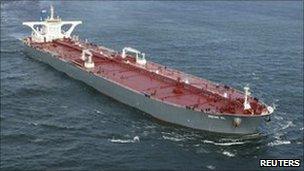Somali piracy 'threatens global oil supplies'
- Published

The Irene SL was attacked about 400 miles (650km) south-east of Muscat
A tanker owners' group has urged governments to do more to combat piracy in the Indian Ocean, saying hijackings could disrupt global oil supplies.
It said Somali pirates were now using at least 20 seized vessels as mother ships to launch attacks in the region.
The warning follows the latest hijacking by of a supertanker carrying some $200m (拢125m) worth of crude oil off the coast of Oman.
The Irene SL was on its way from the Gulf to the US when it was attacked.
Joe Angelo, the head of the International Association of Independent Tanker Owners (Intertanko), said that the Greek-flagged tanker's cargo represented approximately 20% of one day's US crude oil imports.
"The piracy situation is now spinning out of control into the entire Indian Ocean," Mr Angelo told Reuters.
"If piracy in the Indian Ocean is left unabated, it will strangle these crucial shipping lanes with the potential to severely disrupt oil flows to the US and to the rest of the world."
Intertanko represents the owners of much of the world's tanker fleet.
25-member crew
Athens-based shipping company Enesel said 333m (1,093ft) Irene SL "was attacked by armed men" on Wednesday morning.
"For the moment there is no communication with the vessel."
The EU's naval mission in the region, the tanker was sailing 400 miles (650km) south-east of Muscat when it was seized.
Although the incident happened hundreds of miles from Somalia, pirate gangs are known to operate there.
Greece's Merchant Marine Ministry told the Associated Press that the ship was carrying 266,000 tons of crude oil. It is believed to be one of the largest vessels ever seized.
It has a 25-member crew including seven Greeks, 17 Filipinos and one Georgian, according to the ministry.
The incident comes a day after pirates took control of an Italian oil tanker in the Indian Ocean, some 800 miles from Somalia's coast.
Before the latest incident, Eunavfor said pirates were currently holding 29 vessels along with an estimated 681 hostages.
Somali pirates have made millions of dollars in recent years by capturing cargo vessels in the shipping lanes around the Horn of Africa and holding the ships and crew for ransom.
Somalia has had no functioning central government since 1991, allowing piracy to flourish off its coast.